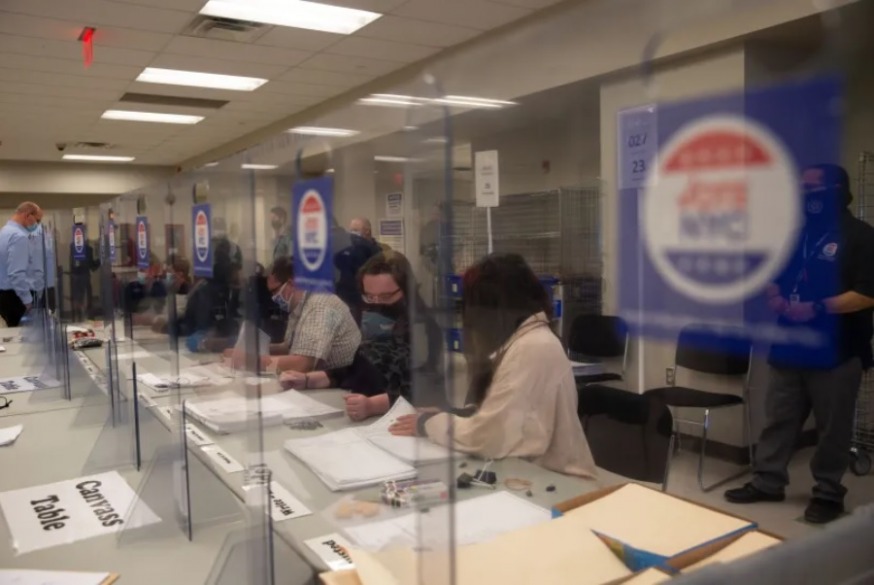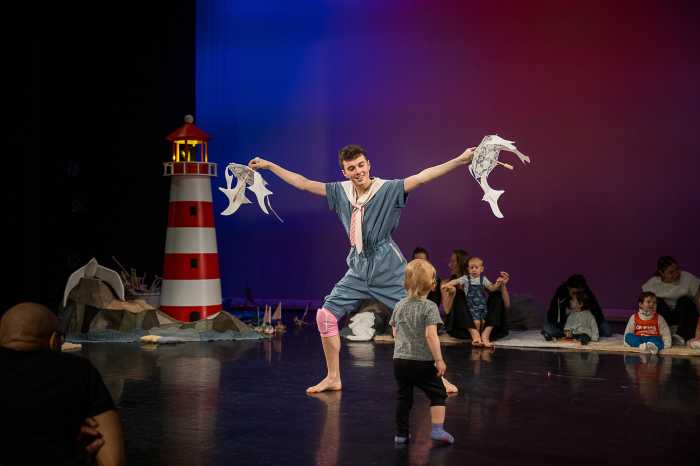
Board of Elections workers tally ballots, March 16, 2021.Ben Fractenberg/THE CITY

This article was originally published by The CITY on Oct. 31
There will be more than just candidates on your ballot in November.
New York City voters also will have four proposals to decide on: a statewide proposal that would boost spending in Albany on future environment-related projects plus three city proposals to create a “statement of values” for the government, form a racial equity office, and define how the cost of living is calculated.
If approved, the four ballot questions — one that pertains to the state and three to the city — would each take effect right away.
Based on history, it’s more likely than not that voters will approve them. According to the nonprofit Ballotpedia, New York State voters have approved just over 70 percent statewide ballot measures since 1985 — 39 of 55 total.
The four ballot proposals as they will appear on the ballot are listed here. The full proposal language for Proposal 1 can be read here; Proposals 2, 3 and 4 can be read here.
Proposal 1: Environmental Bond Act of 2022
This proposal would allow New York State to borrow $4.2 billion through a bond issuance for specific environment-related projects and policy efforts.
That includes $250 million for improving stormwater systems, $200 million for wastewater infrastructure, $500 million for zero-emissions school buses and $1.5 billion for climate mitigation such as wetland protection and renewable energy projects.
Elizabeth Moran, an Albany-based policy advocate at EarthJustice, said the bond act is a good start, but the state will “need to invest far more when it comes to addressing the climate crisis.”
“We would get a boost should voters approve this. The state will get a boost from the recently passed Inflation Reduction Act. But we know that a lot more is going to be needed,” Moran said.
This would be the first environmental bond act enacted for 26 years in New York, according to the Rockefeller Institute of Government.
The idea for the Bond Act has been around for several years, but first took form when then-governor Andrew Cuomo introduced it in his 2020 State of the State address as a $3 billion bond issuance. It might have gone to voters that year, but was ultimately cut from the state government priority list due to overlapping financial concerns as the COVID-19 crisis unfolded.
Gov. Kathy Hochul revived the concept last fall, adding another $1.2 billion to the total. The state legislature approved the measure as part of this year’s budget package, sending it to voters as a November ballot proposal.
Proposal 2: Statement of Values for City Government
This measure would create a mission statement of sorts for New York’s government by adding a preamble to the city charter that includes a statement of “values and vision,” the ballot proposal says, that aims to create a “just and equitable city for all.”
The proposal, like proposals three and four, was born from former mayor Bill de Blasio’s Racial Justice Commission. The mayor convened the RJC in 2021 following the widespread protests of systemic racism and police violence in 2020.
In the RJC’s final report, it recommended a preamble that “acknowledges and speaks to historical wrongs” in order to “reconstruct, revise and reimagine our city’s foundations, structures, institutions, and laws to promote justice and equity for all New Yorkers.”
“The first step towards accountability and healing is telling the truth,” the commission wrote.
Proposal 3: Racial Equity Plans and Office
This measure would bring three new requirements to the city charter: mandating that all city agencies create “racial equity plans” every two years, establishing a new Office of Racial Equity to coordinate racial equity planning across city government and creating a Commission on Racial Equity. That commission would identify and propose priorities for racial equity planning, and review the racial equity plans for each city agency.
In its report, the RJC said it heard input from “dozens of speakers” as it took public testimony “about the need for a centralized body within city government tasked with ensuring that the city intentionally works toward undoing the legacy of structural racism.”
“We heard that without a clear focus on racial equity, we cannot get to our goal of a city where race is no longer determinative of economic, political, social, or psychological outcomes,” the report says.
Proposal 4: True Cost of Living
This measure would mandate that the city government use a new method to calculate the “true cost of living” in the city without taking into account public, private or informal assistance a person or household may receive.
The RJC advocated for this change, it said, because it concluded that current poverty measures are not accurate for New York City’s needs or policy decisions.
A commonly used federal poverty measure developed decades ago does not take regional costs into consideration, it said. To combat that, New York created its own measure — called the NYCgov Poverty Measure — but “it still calculates public assistance as income,” which skews the economic picture, says the report
Instead, the proposed “true cost” measure would be based on “actual household income required to meet the essential needs of people living in New York City,” the commission said. It would include costs related to housing, childcare, food, transportation, healthcare, clothing and shoes, hygiene products, household items, and telephone and internet services, among other things.
Andrew Rein at the Citizens Budget Commission said there is “logic for the measure” and it “might very well be useful,” but cautioned that it may need to be more specific.
For example, he asked, if all housing subsidies should be removed from the calculation, “Are you saying that you should figure out what the housing market would be in New York without NYCHA supporting it? Or rent-stabilized apartments?”
“There’s really a lot of complexity,” he said. “What is outlined here is a good start, but really, it would probably be much better if it were refined.”
THE CITY is an independent, nonprofit news outlet dedicated to hard-hitting reporting that serves the people of New York.






